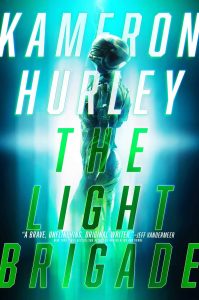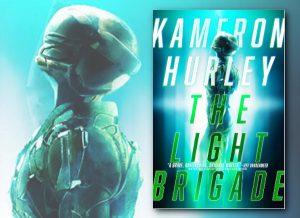Kameron Hurley – The Light Brigade
“People succumb to fear, no matter the government. The everyday person doesn’t want war, but it’s remarkably easy to convince them. It’s the government that determines political priorities, and it’s easy to drag people along with you by tapping into that fear. I don’t care if you have a communist mecca, a fascist regime, or a representative democracy, even some monarchy with a gutless parliament. People can always be convinced to turn on one another. All you have to do is convince them their way of life is being attacked. Denounce all the pacifist liberal bleeding hearts and feel-good heretics, the social outcasts, the educated. Call them elites and snobs. Say they’re out of touch with real patriots. Call these rabble-rousers terrorists. Say their very existence weakens the state. In the end, the government need not do anything to silence dissent. Their neighbours will do it for them.”
 Kameron Hurley is a writer who keeps going from strength to strength. Her brilliant standalone feminist space opera The Stars Are Legion (2017) is for me easily the most impressive and original space opera of the last five or so years, and with The Broken Heavens (2020) she recently brought her wonderful and insanely complex and ambitious Fantasy trilogy the Worldbreaker Saga to a powerful and satisfying conclusion. No small feat then that her 2019 standalone military SF novel The Light Brigade is possibly her most urgent, powerful and accomplished work to date. With The Light Brigade, Hurley is a writer at the peak of her powers, crafting an original, engaging narrative that speaks urgently to the times we live in whilst forming a critical dialogue with classic works of military SF and the genre itself. Hurley effortlessly combines a twisty time travel plot, blistering action sequences, engaging character work and a scathing critique of capitalism and the violence that upholds it. This is an incredible, vital example of what SF at its finest can do, and a tribute to the imaginative power of one of the genre’s key voices.
Kameron Hurley is a writer who keeps going from strength to strength. Her brilliant standalone feminist space opera The Stars Are Legion (2017) is for me easily the most impressive and original space opera of the last five or so years, and with The Broken Heavens (2020) she recently brought her wonderful and insanely complex and ambitious Fantasy trilogy the Worldbreaker Saga to a powerful and satisfying conclusion. No small feat then that her 2019 standalone military SF novel The Light Brigade is possibly her most urgent, powerful and accomplished work to date. With The Light Brigade, Hurley is a writer at the peak of her powers, crafting an original, engaging narrative that speaks urgently to the times we live in whilst forming a critical dialogue with classic works of military SF and the genre itself. Hurley effortlessly combines a twisty time travel plot, blistering action sequences, engaging character work and a scathing critique of capitalism and the violence that upholds it. This is an incredible, vital example of what SF at its finest can do, and a tribute to the imaginative power of one of the genre’s key voices.
Dietz is a grunt for the Tene-Silvia Corporate Corps, who signed up because her family and her way of life were destroyed when São Paulo was obliterated by the Martians in the Blink. She undergoes a brutal training procedure to prepare her to be turned into light and beamed to the battlefront, where she will fight in the interplanetary corporate wars. However when she materialises in her first drop, things start to go horribly wrong, as the reality she sees fails to match up to her mission briefings. Either Dietz is experiencing the war out of order and her superiors are lying to her, or she is succumbing to combat madness. As events unfold and Dietz gets sucked further in, she will have to decide what she truly believes in and whose side in the conflict she’s really on.
From the set-up onwards The Light Brigade is in dialogue with classic works of military SF like Robert Heinlein’s Starship Troopers (1959) and Joe Haldeman’s The Forever War (1974). Hurley’s novel serves as a corrective to the right wing jingoism of Heinlein, and to the dated and messy portrayals of gender and sexuality in Haldeman’s work. Ultimately Hurley is talking back, bravely and convincingly, to these beloved yet flawed works of an older generation. Hurley portrays in unflinching detail the process of brutalisation and dehumanization undergone by the recruits to turn them into killing machines. The first section of the book is unsparing in its depiction of how the soldiers are broken down so that they can be remade in a form useful to the military and the corporations. As Heinlein and Haldeman were both writing about the times they live in, Hurley is very much talking about the present day. In the dystopian future of The Light Brigades, everything, including the military, is owned by corporations, who can decide the citizenship status of people based on their relationship to the corporation. Thus, Hurley draws a direct line between the brutal dehumanisation of the young soldiers and the treatment of workers by corporations. In The Light Brigade, your value as a human is directly tied to your value to the corporation, who can dangle the full rights of personhood in front of disenfranchised workers and use it to force them into corporate slavery.
Hurley’s novel is a meditation on violence, and the cost of violence on the people who receive it and dole it out. It is a novel that forces us to confront our attitudes to violence as readers. Why do we find violence entertaining? Is there an issue with all these works of SF and Fantasy that casually use genocide and extreme violence as a narrative backdrop? The Light Brigade directly questions and subverts this – in Dietz’s journey of self-realisation, she comes to realise the value of all life in defiance of her training, and manages to become an instrument for saving lives rather than taking them. This is achieved masterfully by Hurley’s narrative, who, like an expert stage magician diverts the reader’s attention and with sleight of hand makes us question everything we think we’ve seen. Much as how in The Stars Are Legion the story’s quest structure hides a more complex and daring narrative structure, the time travel in The Light Brigade allows Hurley to tell a story in opposition to the violence that happens within it, and so highlight that there are other ways than simply following the destructive patterns laid out for us. In this way it is a book that offers hard-won hope in the disconcerting times we live in.
Throughout The Light Brigade the reader is constantly amazed at the brilliance of Hurley’s writing. She manages to draw a cast of compelling, conflicted characters, all who have meaningful and satisfying arcs, many of them not occurring linearly from the protagonist’s point of view. The novel is full of shout outs and references to science fiction past and present, from The Forever War to the stories of James Tiptree, Jr’s to Hurley’s contemporaries like N. K. Jemisin, many of which later pay off in intriguing ways. Her writing is lean, powerful and muscular, her characterisation sharp and deft. Perhaps the most impressive thing is that she makes a work of considerable narrative complexity and philosophical heft such a fun, fast-paced read. This is a novel that delivers on the promise of pulp science fiction’s action and adventure, and of speculative fiction’s engagement with high concept science and social and political ideas, one that engages as passionately with SF’s rich literary history as it does with contemporary concerns facing its readers today. It’s a pleasure to see Hurley at the top of her game.

